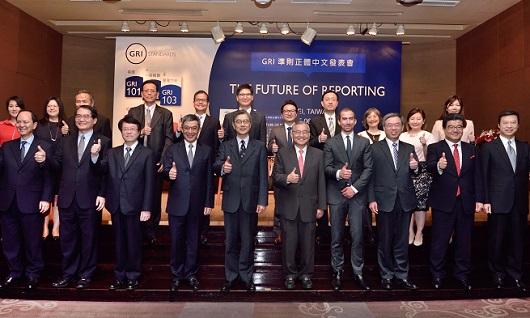Hundreds Welcome GRI Standards Across Asia

Asia is ready to take its sustainability reporting to the next level. Venues at the recent GRI Standards launch events in Taiwan, Indonesia and Vietnam were packed with participants, eager to support the move towards quality reporting.
Asia Pacific has been the region with the strongest growth in sustainability reporting in recent times. This growth is vastly driven by the surge in reporting policies and regulations, particularly those implemented by financial market regulators. 79% of the 100 largest companies in Asia Pacific report on their sustainability impacts, surpassing even Europe and North America (Carrots & Sticks, 2016).
The launch of the GRI Standards in three key Asian languages: Traditional Chinese, Bahasa Indonesia, and Vietnamese, comes at a defining time in the region, when the emphasis is moving to further evolving the sustainability reporting landscape through higher-quality reporting.
Here’s a quick overview of the prominent themes and discussions at these launch events.
Taiwan: GRI Standards to boost market resilience
The significance of sustainability reporting in this small island attracted over 200 attendees to the launch event in Taipei on 6 June. The event, hosted by the Business Council for Sustainable Development of Taiwan (BCSD-Taiwan), introduced the Traditional Chinese version of the GRI Standards.
Speaking at the opening, President of the Taiwan Stock Exchange Lee Chi-Hsien, and Vice Chairperson of the Financial Supervisory Commission Huang Tien-mu, emphasized the importance of corporate transparency in boosting market resilience, and ultimately creating a more sustainable economy.
President of the Taiwan Stock Exchange Lee Chi-Hsien expanded on the impact that the GRI Standards will have on local and regional development: "The Taiwan Stock Exchange mandates GRI reporting for large and listed companies in certain sectors. By advocating the GRI Standards we aim to increase transparency and accountability, and demonstrate commitment by the Taiwanese market to maximize the value of the sustainability reporting process. This will in time have a positive effect on the economy, not only in the Greater China region, but also worldwide given Taiwan’s role within the global supply chain.”
Indonesia: Enabling sustainable value chains through GRI reporting
The GRI Standards were launched in Bahasa Indonesia on 8 June in Jakarta. The half-day event, held during Ramadan, was attended by over 100 participants, and featured an all-female panel. The panel discussion focused on the significance of sustainability reporting in value chains, particularly in the local context.
Paul Westin, Counselor for Energy at the Swedish Embassy in Jakarta, spoke at the event: “I wish to congratulate GRI on the launch of their sustainability reporting standards in Indonesia. GRI has been a champion of sustainability reporting, and Sweden, through our International Development Cooperation Agency, has supported GRI for many years now to contribute to economic, environmental and social development in emerging countries.”
Though Indonesia already has some regulations on corporate social responsibility, there is no clear policy or law regarding sustainability disclosure. Speaking in the panel, Unilever Indonesia General Manager Sinta Kaniawati pointed out their effort in campaigning to make sustainability living commonplace in Indonesia. Advancing sustainability reporting among supply chains will support this effort and ultimately lead to tangible improvements in the lives of millions of people.
Vietnam: Using GRI Standards to monitor progress on SDGs
The launch of the Vietnamese version of the GRI Standards in Ho Chi Minh City, received more than 160 participants, and widespread local media coverage. The event was co-organized by the Ho Chi Minh City Stock Exchange (HOSE) and the Vietnam Chamber of Commerce and Industry (VCCI) on 13 June, and attended by high-level representatives from the Ministry of Natural Resources & Environment, Ministry of Labor, Invalids and Social Affairs, VCCI, and both the Hanoi and Ho Chi Minh stock exchanges.
Consul General of Switzerland Othmar Hardegger, representing the Swiss State Secretariat of Economic Affairs (SECO) at the event, delivered the welcome address. He emphasized the importance of sustainability reporting for small and medium enterprises (SMEs) in the region: “Sustainability reporting becomes a critical competitive differentiator for SMEs to be integrated as local suppliers into global value chains. This should ultimately contribute to more jobs and income opportunities.”
Speaking on behalf of the Vietnam Chamber of Commerce, Deputy General Director Tran Ngoc Liem stated: “We encourage enterprises to participate in building and monitoring sustainable development indicators following the GRI Standards, so that Vietnamese enterprises can develop sustainably and compete effectively in the context of integration. This will create a competitive advantage and contribute significantly to the implementation of SDGs in Vietnam”
Check out our GRI Standards translations program to find out more about available downloads and upcoming language translations of the GRI Standards.

